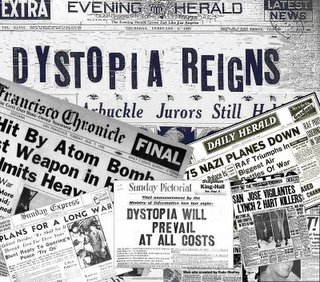Critics of the mortgage interest tax deduction point out that homeowners are in effect having the state subsidizing their choice to purchase a home above those who choose to rent one. While upfront this charge appears to be a valid criticism of unjust state intervention on behalf of owners, I believe it can be refuted to satisfaction both from an ethical standpoint, but more importantly from a economics viewpoint.
The ethical charge is that by allowing income tax deductions, the state is influencing my choice to own a home instead of merely renting its service, unevenly distributing the 'costs' of maintaining government via disproportionate taxation to those who can't afford or choose not to buy a home.

From the homeowners perspective, he certainly might have contemplated the tax advantages, it's dishonest to label this as equal to a coercive relationship where the burdens of one are shifted onto others for a very simple reason; John Q. Homeowner may have never formally consented to being responsible for a certain 'fair' share of a national tax burden. Thus so, his avoidance of tax penalties can't be labeled unethical, any more so than any person who attempts to avoid financial or bodily harm.
You cannot easily claim that the homeowner consented to his government's claim on his income based on the fact that one "chose" to live within its territory, as there can be no such thing as choice, nor consent where coercion is being imposed upon unwilling individuals.
Choice is the expression of an individuals free will. One has the free will to makes choices, even in choices which may result in painful conditions. For instance, a person whose appendage is gangrene may have to make the difficult choice of amputation, and being that the nature of the circumstances is not determined in the human realm of action, a person who has to choose between death by infection or amputation of a limb is still making a choice, however hard.
On the other hand, a person who is told to choose between "your money or your life" did not make a choice when he hands the robber his wallet, since the false dichotomy of choice is only the result of the robbers actions fostered against the victim. The robber whom is later caught cannot claim that the wallet's former owner gave his possession of it willingly, and of his own choice. This is what a statist wants you to believe-- that your choice to not pick up and move elsewhere is a expression of your true choice and an express willingness to participate in the political system to which one is subject.
[Of course there is also the practical concern that there is nowhere one can go to escape the claim of some sovereign over the individual, so the assertion that a coerced individual chose his fate of political participation based upon where he chooses to live is a specious one.]
To get back to the subject matter, we may also examine the ramifications of the "unfair" tax benefits to housing, because perhaps it does not even effect what people think it does. To repeat-- the claim that home ownership is being subsidized by government, one has to first show that home owners are actually saving money by choosing to own, instead of renting.
A while ago I read a
post on
Cattalarchy by Bill Cholenski which opened my eyes to this matter:
A quick point (or three): when you buy a house, you buy the location, you buy the bricks, you buy the new windows. You buy the garage, the driveway, the shade in the backyard on the hot summer afternoons. You buy the proximity to highway (or train), the local deli, movie theater, or shopping mall. You buy many things that contribute to the value of the house. They all contribute to the PRICE of the house.
What some people forget is that YOU'RE ALSO BUYING THE TAX ADVANTAGES. You're paying for the privilege of getting money back each year. IT DON'T COME CHEAP... My point: house prices are higher because of these tax advantages... Anything worth buying is worth paying for. You can't get something for nothing. There's no free lunch. Houses are not magic. [insert catch-phrase here].
Bottom line: Tax deductions on mortgage interest don't benefit the people they "intend" to help.

Even without looking to empirical studies, it can thus already be deduced that the cost/benefit ratio of home ownership is not as sexy as your accountant thinks it is. One might attribute the benefit of "building equity" as the primary reason that people prefer the pricier option of home mortgage payments instead of "throwing away your rent money", but the more I think about the popularity of car leasing, the more it tells me that people are not so much interested in owning the cow as they are in just paying for its milk.
Empiracally (however much weight you deem to the science of statistics) it has been shown that for New York City, the cost benefit of renting is around 30% lower versus owning. Unfortunately I don't have the studies handy, nor have I actually read them, but the 30% disparity has been long bandied about in the
Rent Vs. Own argument, which like the pheonix, is revived from flamewar to flamewar on the real estate blogs I peruse. Even without going into the specifics of the criteria selected for the studies, I am comfortable saying that the studies are just telling us what we already know.
I am not per se
for the mortgage tax deduction, I just think it deceptive to call it a subsidization deserving of a good paleoliberal's scorn. I do readily admit though, that because most people think like accountants and not economists, we probably have an overinvestment in home ownership, rather than something that would more closely reflect the popularity of auto leasing which is less tax distorted.
If the mortgage tax deduction would be eliminated, one could
bet dollars to donuts (fun fact #36) that the rent/owning price disparity would shrink as people would --
a) no longer pay for the tax advantages of ownershipb) would no longer overinvest in homes, thereby both lowering demand for condominiums and at the same time increase demand for leased rentalsThe hard part is explaining that an anarchocapitalist does not truly favor market distortions created through government intervention; to opine that it's wrong not to object to a mortgage tax deduction on the basis of subsidization is just really undeserving, and ignores the reality we coerced individuals are subject to.
 If you've ever desired the four-volume hardcover edition of Murray Rothbard's "Conceived In Liberty" set, but have not purchased it because you chose not to forgo the utility the $100 could secure in other goods, I've recently noticed that Amazon.com is carrying it for a total of $63, including the shipping (which is only nominally 'free' since distribution is just another element of production which readies it for a consumers usage.†)
If you've ever desired the four-volume hardcover edition of Murray Rothbard's "Conceived In Liberty" set, but have not purchased it because you chose not to forgo the utility the $100 could secure in other goods, I've recently noticed that Amazon.com is carrying it for a total of $63, including the shipping (which is only nominally 'free' since distribution is just another element of production which readies it for a consumers usage.†)











































